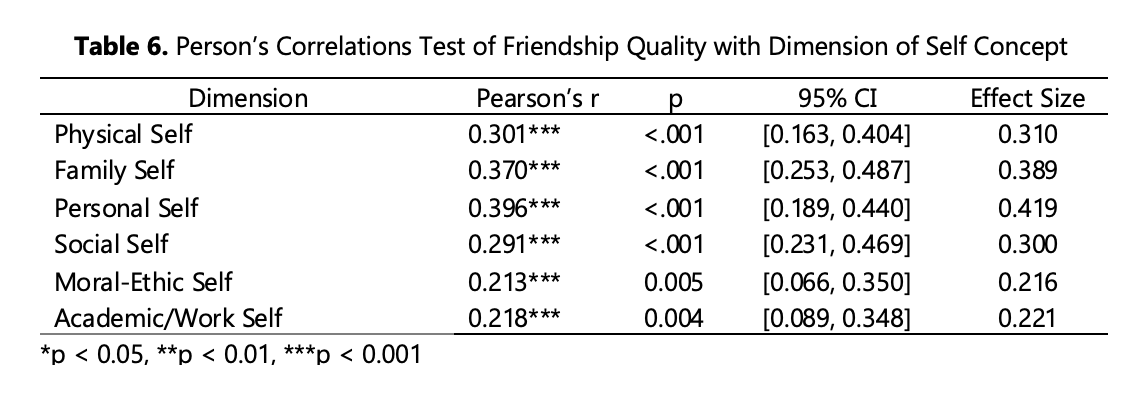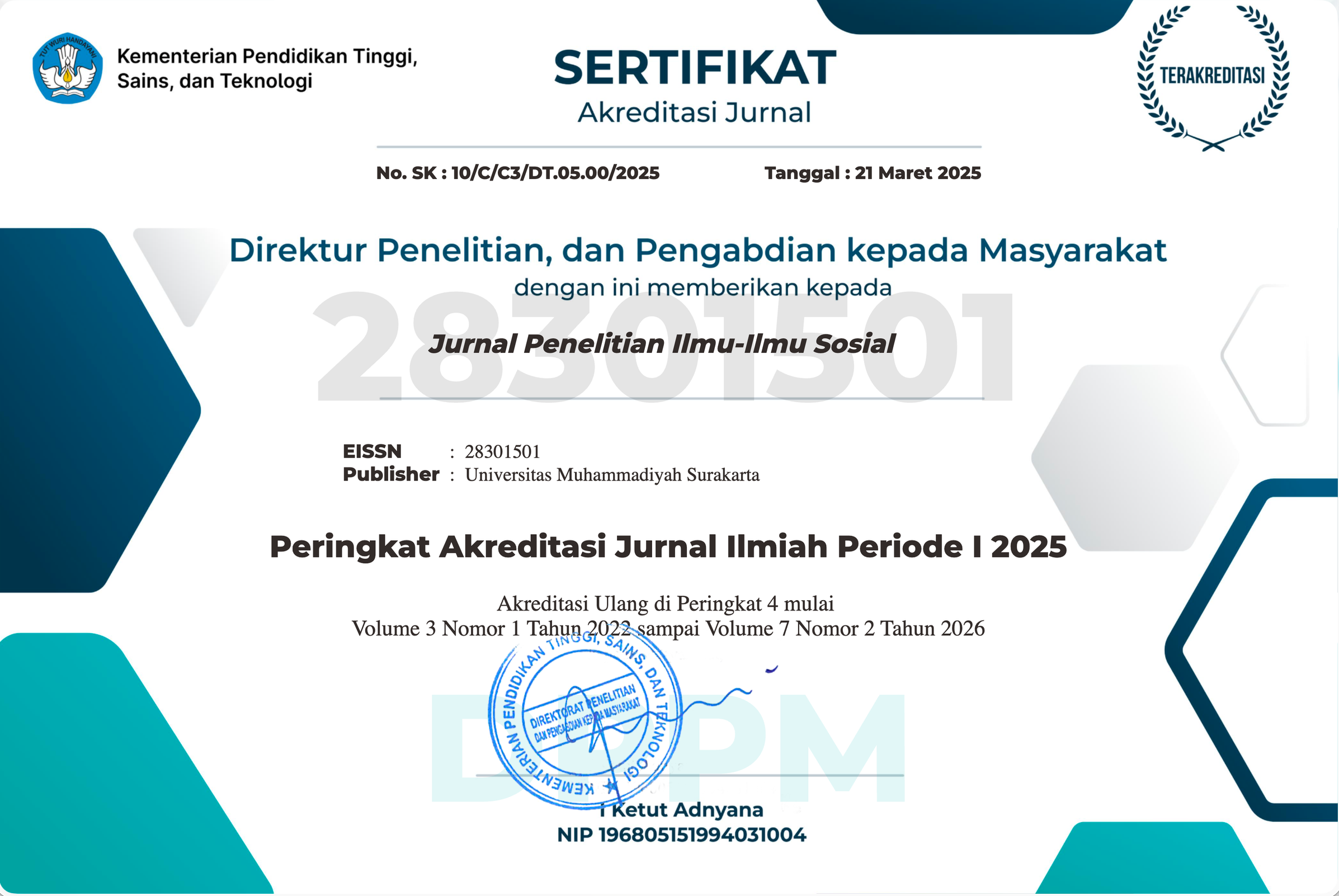Self-Concept and Its Influence on Friendship Quality: A Study of Adolescent Girls in Specialized Educational Settings
DOI:
https://doi.org/10.23917/sosial.v6i2.12298Keywords:
adolescent girl, friendship quality, full-day school, self-conceptAbstract
This study aims to analyze the influence of self-concept on the quality of friendships among female adolescents in an all-girls full-day school environment. The research employs a quantitative non-experimental design with a cross-sectional approach, utilizing simple linear regression analysis. The participants consist of female junior high school students attending a full-day school exclusively for girls in Bogor. The instruments used in this study include the Tennessee Self Concept Scale 2nd Edition (TSCS 2nd Edition) to measure self-concept and the Friendship Quality Scale (FQUA) to assess the quality of friendships. The regression results indicate a positive and significant correlation between self-concept and friendship quality (r = 0.424; p < 0.001), with self-concept contributing 18% of the variance in friendship quality. These findings suggest a significant influence of self-concept on the quality of friendships among female adolescents in the all-girls school setting.
Downloads
References
Alsarrani, A., Hunter, R. F., Dunne, L., & Garcia, L. (2022). Association between friendship quality and subjective wellbeing among adolescents: A systematic review. BMC Public Health, 22, 2420. https://doi.org/10.1186/s12889-022-14776-4
Amaliyah, H. (2025). Hubungan Persahabatan dan Konsep Diri pada Remaja Putri. Jurnal Psikologi, UIN My Batusangka, 4 (1), 34-47. http://dx.doi.org/10.31958/jp.v4i01.15732
Ananda, D. R. T., & Sawitri, D. R. (2020). Konsep diri ditinjau dari dukungan teman sebaya pada remaja di Panti Asuhan Qosim Al-Hadi Semarang. Jurnal Empati, 9(1), 1–10.
Aprilia, N., & Alfiasari, A. (2025). The Role of Parental Academic Socialization and Friendship Quality in Enhancing School Continuation Motivation Among Rural Adolescents. Journal of Child, Family, and Consumer Studies, 4(1), 51-65.
Aulia, F. D., Pradamitha, S. C., & Chadijah, F. (2024). Pengaruh interaksi teman sebaya terhadap karakter individu. Jurnal Harmoni Nusa Bangsa, 2(1).
Avilla, N. (2021). Hubungan Antara Attachment dan Kecerdasan Emosi Dengan Kualitas Persahabatan Pada Komunitas Supermoto Kampar Kiri (Skripsi, Universitas Islam Negeri Sultan Syarif Kasim Riau).
Berndt, T. J. (2002). Friendship quality and social development. Current Direction in Psychological Science, 11(1), 7-10.
Bhawuk, D. P. S. (2018). Culture’s influence on behavior: Collectivism and individualism. In D. Matsumoto (Ed.), The Cambridge Handbook of Culture and Psychology (pp. 35–52). Cambridge University Press.
Bronfenbrenner, U. (1979). The ecology of human development: Experiments by nature and design. Harvard University Press.
Bukowski, W. M., Hoza, B., & Boivin, M. (1994). Measuring friendship quality during pre- and early adolescence: The development and psychometric properties of the Friendship Qualities Scale. Journal of Social and Personal Relationships, 11(3), 471–484.
Dongoran, D. & Boiliu, F. M. (2020). Pergaulan Teman Sebaya dalam Pembentukan Konsep Diri Siswa. Jurnal Educatio FKIP UNMA, 6(2), 381–388. https://doi.org/10.31949/educatio.v6i2.560
Erikson, E. H. (1968). Identity: Youth and crisis. W. W. Norton & Company.
Etikan, I., Musa, S. A., & Alkassim, R. S. (2016). Comparison of convenience sampling and purposive sampling. American Journal of Theoretical and Applied Statistics, 5(1), 1–4. https://doi.org/10.11648/j.ajtas.20160501.11
Fitts, W. H. (1971). The self-concept and self-actualization (1st ed). Los Angeles: Western Psychology Services.
Fitts, W. H., & Warren, W. L. (1996). Tennessee Self-Concept Scale: Second Edition (TSCS:2) Short Form. Los Angeles, CA: Western Psychological Services.
Gowing, A. (2019). Peer-peer relationships: A key factor in enhancing school connectedness and belonging. Educational and Child Psychology, 36(2), 64–77. https://doi.org/10.53841/bpsecp.2019.36.2.64
Hidayat, D. O., Nuari, A. H., Izumi, C., Jantika, G., Evelina, A. N., Hidayati, I. (2025). Hubungan Antara Stabilitas Emosi dan Kualitas Pertemanan pada Siswa/I SMKS Dhuafa Padang. Observasi: Jurnal Publikasi Ilmu Psikologi, 3(1), 217-227. https://doi.org/10.61132/observasi.v3i1.942
Hurlock, EB. (1973). Child Development. Volume 2. Sixth Edition. Jakarta: Erland.
Khristi, T. C., & Kurniawan, A. (2024). Quality of friendship on identity formation in adolescents in Surabaya. Psikoborneo. Jurnal Ilmiah Psikologi, 12(1), 24–28.
Marbun, R. (2024). Hubungan antara Teman Sebaya dengan Konsep Diri pada Remaja Siswa SMP Swasta Elida Medan Sumatera Utara. (Skripsi, Universitas Medan Area).
Matitaputty, J. S., & Rozali, Y. A. (2021). Gambaran Kualitas Persahabatan pada Remaja DKI Jakarta. JCA Psikologi, 2(3), 221-229.
Mochtan, A. N. (2019). Pengaruh dukungan sosial keluarga terhadap konsep diri siswa SMA di Tangerang Selatan. (Skripsi, Universitas Negeri Jakarta).
Monica, N., Herawati, I., Napitupulu, L., & Nugroho, S. (2021). Need To Belong Dan Kualitas Persahabatan. Journal Of Islamic and Contemporary Psychology (JICOP), 1(2), 111–116. https://doi.org/10.25299/Jicop.V1i2.8798
Mutaqqin, D., Chanafi, A. R., Nofelia, B. I. A., Khristi, T. C., & Wahyuningsih, S. (2022). Role of Parents and Friends in Adolescents’ Identity Formation in Indonesia. Indigenous: Jurnal Ilmiah Psikologi, 7(1), 1-14. http://doi.org/10.23917/indigenous.v7i1.15680
Pasenrigading, A. R., Nur, H., & Daud, M. (2025). Pengaruh Media Sosial Terhadap Persepsi Diri dan Pembentukan Identitas Remaja. Socius: Jurnal Penelitian Ilmu-Ilmu Sosial, 2(9), 68-81.
Piaget, J. (1972). Intellectual evolution from adolescence to adulthood. Human Development, 15(1), 1–12. https://doi.org/10.1159/000271225
Pratidina, G. (2020). Hubungan antara konsep diri dengan kemampuan komunikasi interpersonal pada remaja. (Skripsi, Universitas Muhammadiyah Surakarta).
Putri, A. W. (2021). Hubungan Komunikasi Efektif Keluarga dan Konsep Diri dan Peer Group dengan Diri Mahasiswa STIKES Hang Tuah Surabaya (Skripsi, STIKes Hang Tuah Surabaya).
Rachmanie, A. S., & Swasti, I. K. (2022). Peran Kualitas Persahabatan Terhadap Tingkat Stres Dengan Mediator Kesepian. Journal of Psychology, 1(8), 82-94.
Rahmawati, S. (2022). Pengaruh relasi teman sebaya terhadap konsep diri siswa SMP (Skripsi, Fakultas Psikologi, Universitas Islam Negeri Maulana Malik Ibrahim Malang).
Rose, A. J., & Rudolph, K. D. (2021). Gender differences in adolescent friendship quality and emotional support. Journal of Youth and Adolescence, 50(3), 512–526.
Smith, L., & Thompson, R. (2022). Friendship quality and mental health in adolescents: A gender-based analysis. International Journal of Adolescence and Youth, 27(1), 89–104. https://doi.org/10.1080/02673843.2022.2034567
Santrock, J. W. (2011). Adolescence (13th ed.). Boston: McGraw-Hill.
Saputro, Y. A. & Sugiarti, R. (2021). Dukungan Sosial Teman Sebaya dan Konsep Diri terhadap Penyesuaian Diri pada Siswa SMA Kelas X Philanthropy Journal of Psychology, 5(1), 59-72.
Sari, S. G. (2024). Hubungan Kebahagiaan dan Kelekatan Teman Sebaya dengan Kualitas Persahabatan pada Remaja Bullying Victimization (Skripsi., Universitas Islam Negeri Raden Intan Lampung).
Sugiyono. (2021). Metode Penelitian Kuantitatif, Kualitatif, dan R&D. Bandung: Alfabeta.
Syahraeni, A. (2020). Pembentukan Konsep Diri Remaja. Al-Irsyad Al-Nafs, Jurnal Bimbingan Penyuluhan Islam, 7(1), 61-76.
Tanjung, H., Lestari, S., Bahri, S., & Roza, S. D. (2025). Hubungan Antara Konsep Diri dan Penerimaan Perubahan Fisik pada Remaja Wanita pada Masa Pubertas. JUKEJ: Jurnal Kesehatan Jompa, 4(1), 222-227.
Thien, L. M., Razak, N. A., & Jamil, H. (2012). Friendship Quality Scale: Conceptualization, Development and Validation. AARE APERA International Conference, Sydney, Australia, 1–14.
Wei Ye. (2022). The Relationsip Among Adolescents’ Self Esteem, Emotional Intelligence, and Friendship Quality, Research Square. https://doi.org/10.21203/rs.3.rs-1461006/v2
Widiyati, C., & Setyandari, A. (2023). Hubungan Konsep Diri dan Kecemasan Komunikasi Interpersonal pada Mahasiswa Bimbingan dan Konseling Angkatan 2020 Universitas Sanata Dharma Yogyakarta. Solusi: Jurnal Konseling dan Pengembangan Pribadi, 5(2), 67–74.

Downloads
Submitted
Accepted
Published
Issue
Section
License
Copyright (c) 2025 Fairuz Zanirah, Deasyanti, Ratna Dyah Suryaratri, Zarina Akbar, Mira Ariyani, Herdiyan Maulana

This work is licensed under a Creative Commons Attribution 4.0 International License.















